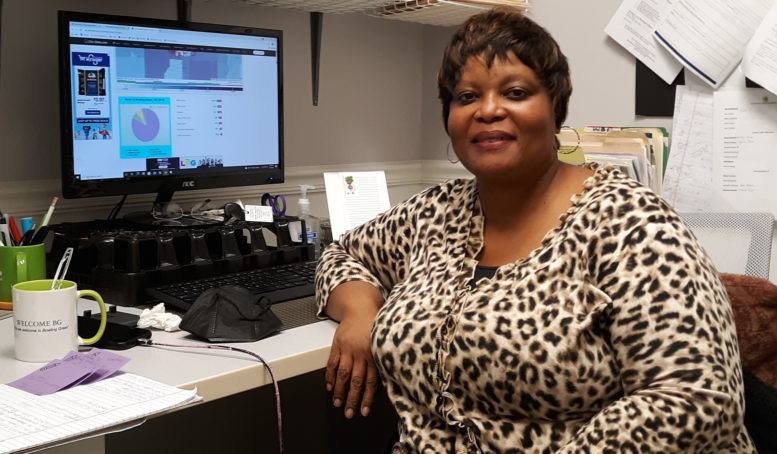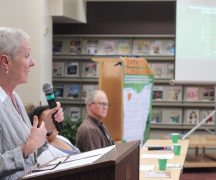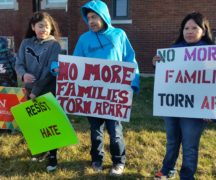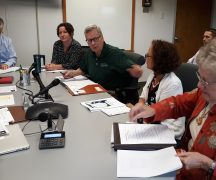By JAN LARSON McLAUGHLIN
BG Independent News
Mojabeng Kamala, a local hospice volunteer for 13 years, was not welcome in some Bowling Green homes. Some families, she explained, were not comfortable with her color.
“The office had to ask families if they minded that I was Black,” Kamala said.
An immigrant in Bowling Green since 2000, she has encountered the best and worst from the community. Kamala, who is coordinator of Welcome BG, shared her experiences Monday evening during a program honoring Dr. Martin Luther King Jr., hosted by the Bowling Green Human Relations Commission.
Kamala and her family came to the U.S. in 1978 to escape apartheid in South Africa. They entered on refugee passports, leaving all they knew behind after her father, a political activist against apartheid, was threatened.
“It was gut wrenching,” she said.
Kamala and her husband, an immigrant from Tanzania, have raised three children. She earned a bachelor’s degree in political science and criminal science at Ball State University, then went on to get her master’s in public administration and criminal justice. She has worked in law enforcement in Lucas County, and started an interior design business.
Despite that, some only see her blackness and hear her accent.
When her son went to school at St. John’s, Kamala was asked if he got an athletic scholarship.
“Think about that,” she said, noting that her son was the least athletic boy.
When her husband wears BGSU clothing, he is often asked if he coaches at the university.
“Again, think about that.”
When two of their children attended Maumee Valley Country Day School, she was asked how her family could afford the tuition.
“Think about that one,” she said.
And when she was stopped by police – for a legitimate reason – the officer looked at her license and asked how she could afford to live on a street that he couldn’t afford.
“Again, think about that.”
Kamala said she has a neighbor she shares mailboxes with, who for years refused to speak to her until Kamala’s daughter tutored the neighbor’s daughter in a class she was failing.
She has been asked if she grew up in a country where animals roamed the streets.
“I wish I could say those were questions from the children. Sadly, not.”
Kamala said she had to call police when her store was spray painted, and when a couple men called her racist names and refused to leave her business. She was disappointed when the officer lectured her, not the men.
“This and more happens right here in our town,” she said. “I’m just only one of the stories.”
But there are positives. St. Mark’s Lutheran Church has been a “constant family” for her family, she said.
And her work as coordinator of Welcome BG has brought together city leaders and community members to make Bowling Green welcoming to immigrants. The organization is working on facing uncomfortable truths and being “intentionally inclusive.”
Immigrants are often portrayed as poor, criminals and wanting to deplete government programs. Kamala’s personal and professional experience is far from that stereotype.
“Immigrants are not the enemy,” she said.
“We carry our families we left behind in our spirits,” she said. “We are motivated to succeed in their honor.”
Immigrants have the same goals as others – to provide for their families and raise healthy, honest children, she said.
“We do not want to be tolerated,” Kamala said. “Do not get us off the shelf only when your organization needs to qualify for grants. Do not get us off the shelf when you need to be marketed as diverse and inclusive.”
King’s message to America is just as relevant today, Kamala said.
“The needle has not moved much.”
But King has been “repackaged for marketing,” she said. In the 1950s and 1960s, he was considered quite radical.
“He was threatening to many who wanted to silence their own guilt,” she said. “He was threatening to those comfortable with the status quo.”
And King was “terrifying” to those who did not want to see children of color joining hands with white children, she said.
But Kamala was optimistic.
“Bowling Green has the tools and the heart to tackle and face all the issues that threaten to unravel our town,” she said. Not In Our Town stands up against injustice and ill treatment, she added.
“Free at last, free at last. Thank God almighty we are free at last,” she said, quoting King. “Until every person in the country, regardless of color, race, religion and background, can confidently utter those words, the needle has not moved.”

The other keynote speaker, Arianna Bustos, talked about her devotion to equitable teaching practices.
Ellie Boyle, chairperson of the Bowling Green Human Relations Commission, noted the challenges facing educators with the Ohio State House introducing two bills last year that would curtail the teaching of some aspects of American history considered to be divisive.
“It poses the question – are we really representing Dr. King’s values if we are not paying attention to all voices throughout history,” Boyle said.
Bustos, a BGSU student, talked about her passion for culturally responsive teaching and advocating for marginalized students’ rights.
In the 1950s and 1960s, King’s focus was on equality – which was the step needed before striving for equity, Bustos said.
“Black people did not have basic human rights,” she said. “Equal treatment was the first obstacle to knock down back then.”
But now, America needs to progress to equity, Bustos said.
“Students don’t just deserve equality in education. They deserve equity,” she said. “Equality is the bare minimum.”
Bustos explained the difference, with equality offering the same opportunities and resources to all. Equity recognizes that everyone doesn’t begin in the same place in society. Some have more challenges.
Bustos encouraged her audience to become part of the “ripple effect” of activism.
“It is never too late to start some level of activism,” she said.
Also during the program honoring King, musical selections were performed by the BGHS Madrigals and BGSU Music College faculty Ariel Kasler. The lyrics to “Lift Every Voice and Sing” were read by Ana Brown, the 2021 recipient of the Drum Major for Peace Award.





